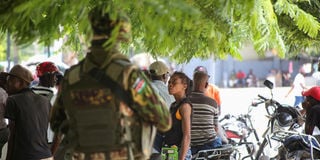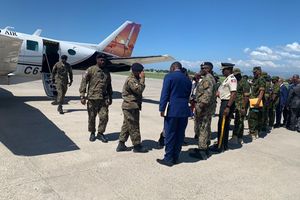
A Kenyan police officer stands guard during a joint operation with Haitian police, in Port-au-Prince, Haiti July 29, 2024.
An international policing force in Haiti, led by Kenyan police officers, has started clearing gang hideouts around the international airport in Port-au-Prince.
The Kenyan-led Multinational Security Support (MSS) Mission on Sunday started bringing down notorious hideouts surrounding Toussaint Louverture International Airport.
Located in Tabarre, a commune of Port-au-Prince, the airport is among vital installations that had been captured by gangs in March forcing the immediate former Haiti Prime Minister Ariel Henry to fear returning to the Caribbean nation.
Henry had traveled to Kenya for talks with President William Ruto on the deployment of officers to Haiti only for the gangs to lay siege on the airport blocking his return.
On the northern part of the airport are several incomplete structures that the gang members have been operating from.
“There are ongoing demolitions targeting a number of buildings around the airport. The buildings have been home to armed gang members who used to carry out attacks with the aim of stopping operations in the main international airport in Haiti,” said Mr Godfrey Otunge who is the mission’s commander.
The gangs that have been operating within the airport are part of Viv Ansanm, an alliance of gang leaders that was formed on September 22, 2023.
The coalition brought together the main gang factions operating in Port-au-Prince which include G9 and G-Pep which pledged that they will protect civilians and called on the population living in gang-controlled neighbourhoods to resume their daily activities, which are often disrupted by gang conflicts.
Mr Otunge said that since the airport was the main entrance for foreigners and is also used in bringing in some of the equipment they need during the mission scheduled to end in October 2025, then there was a need of ensuring that it was secure.
Bulldozers in action
The Nation is in possession of a number of videos where bulldozers are captured destroying the buildings which have been home to the gang members for years now.
The gangs took control of the buildings after they forcefully kicked out the owners with the aim of controlling what comes into the country through the airport.
Compared to early this year and previous years, the number of international and local flights in the gang infested country have increased in the recent past.
A spot check on flight radar which is a global flight tracking service that provides one with real-time information about arrivals and departures of planes across the world a total of 42 aircrafts have landed at the airport.
On Sunday, a total of 21 aircrafts landed at the airport. They are from the companies known as; Sunrise Airways, American Airways, Jet Blue Airways, Spirit Airlines, InterCaribbean Airways, Air Transant and Air Century.
On Monday, a total of 23 aircrafts landed at the airport and today, Tuesday a total of 18 aircrafts will be landing there.
Meanwhile, the officers in the mission who are from Kenya, Jamaica and Bahamas have been conducting operations in Pont Sonde where gangs on October 3, 2024, carried out an attack killing 70 people.
The officers alongside those attached to the Haiti National Police (HNP) have even launched a manhunt for Elan Luckson who is in charge of Gran Griff gang that allegedly conducted the attack.
According to the Kenyan officers in Haiti, at Pont Sonde, the gangs have dug trenches and ditches, and erected barricades on the main road that heads there. In addition, they have also erected logs that carry human skulls as a way of sending a message that Pont Sonde is a no-go zone.
However, on Friday, the officers managed to gain entry into the area where they nabbed a number of Gran Griff gang members who are being grilled with the aim of arresting more of their counterparts.
“For the officers to gain access to the gang’s hideout at Carrefour Paye intersection on the road that leads to the home of Elan Luckson, the officers had to fill up the dug trenches with sand,” said an officer who was part of the operation.
According to the MSS team the officers ended the operation at Pat Chwal area in Haiti where they managed to recover a number of weapons.
This comes at a time when Kenya is planning to deploy an additional 600 officers to the mission.
President William Ruto in early October said that Kenya will be sending an additional 600 officers in November to Haiti. Already, there are 400 Kenyan police officers in the Caribbean based nation.
It is worth noting that the MSS mission is currently on its second stage which is decisive/operation stage that has seen Haiti police together with Kenyan police officers, actively engaging in operations to flush out gangs from Port-au-Prince beginning June this year.
Though the mission has reached stage two, there are still problems with the initial stage which was the deployment stage that was supposed to see security officers coming in from Kenya, Jamaica, the Bahamas, Antigua and Barbuda, Bangladesh, Benin, Chad, and Guinea.
These concerns were also shared by President Ruto who while addressing the media alongside Haiti’s Prime Minister Garry Conille said that countries should keep their word and provide what they had promised as Kenya was doing.
This delay by the other troop-contributing countries has largely been seen to be a tactful delay as the countries await for the results of the US elections before they can go ahead and deploy their officers.
It is crucial to note that the US is the largest financier of the MSS mission in Haiti.
The third stage of the mission is the stabilisation stage where the mission will focus on strengthening Haiti’s public institutions such as hospitals, schools, the judiciary as well as the security agencies so that they can stand on their own after the conclusion of the mission.
The final stage- the transition stage will take place after the United Nation Security Council and the MSS team analyse the situation and ascertain that Haiti is on the right track to sustain its governance structures and peace. This will see the MSS mission ended and the government of Haiti left with the singular role of maintaining law and order within its territory as the troops exit and head back to their countries.








